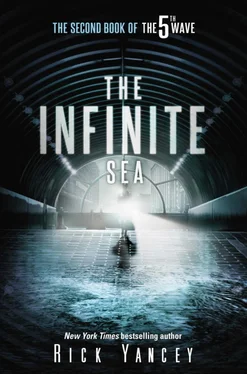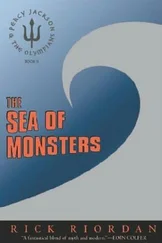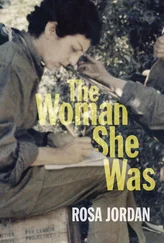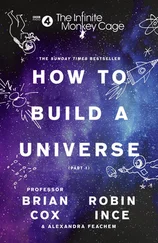“It’s funny,” he says. “How much we thought all of it did. You know what really matters?” He waits for my answer. I feel as if I’m being set up for a joke, so I don’t say anything. “The tardy bell.”
Now he’s forced me into a corner. I know there’s manipulation going on here, but I feel helpless to stop it. “Tardy bell?”
“Most ordinary sound in the world. And when all of this is done, there’ll be tardy bells again.” He presses the point. Maybe he’s worried I don’t get it. “Think about it! When a tardy bell rings again, normal is back. Kids rushing to class, sitting around bored, waiting for the final bell, and thinking about what they’ll do that night, that weekend, that next fifty years. They’ll be learning like we did about natural disasters and disease and world wars. You know: ‘When the aliens came, seven billion people died,’ and then the bell will ring and everybody will go to lunch and complain about the soggy Tater Tots. Like, ‘Whoa, seven billion people, that’s a lot. That’s sad. Are you going to eat all those Tots?’ That’s normal. That’s what matters.”
So it wasn’t a joke. “Soggy Tater Tots?”
“Okay, fine. None of that makes sense. I’m a moron.”
He smiles. His teeth seem very white surrounded by the scruffy beard, and now, because he suggested it, I think about kissing him and if the stubble on his upper lip would tickle.
I push the thought away. Promises are priceless, and a kiss is a kind of promise, too.
 2
2 
UNDIMMED, THE STARLIGHT sears through the black, coating the highway in pearly white. The dry grass shines; the bare trees shimmer. Except for the wind cutting across the dead land, the world is winter quiet.
I hunker beside a stalled SUV for one last look back at the hotel. A nondescript two-story white rectangle among a cluster of other nondescript white rectangles. Only four miles from the huge hole that used to be Camp Haven, we nicknamed it the Walker Hotel, in honor of the architect of that huge hole. Sullivan told us the hotel was her and Evan’s prearranged rendezvous point. I thought it was too close to the scene of the crime, too difficult to defend, and anyway, Evan Walker was dead: It takes two to rendezvous, I reminded Zombie. I was overruled. If Walker really was one of them, he may have found a way to survive.
“How?” I asked.
“There were escape pods,” Sullivan said.
“So?”
Her eyebrows came together. She took a deep breath. “ So … he could have escaped in one.”
I looked at her. She looked back. Neither of us said anything. Then Zombie said, “Well, we have to take shelter somewhere, Ringer.” He hadn’t found the brochure for the caverns yet. “And we should give him the benefit of the doubt.”
“The benefit of what doubt?” I asked.
“That he is who he says he is.” Zombie looked at Sullivan, who was still glaring at me. “That he’ll keep his promise.”
“He promised he’d find me,” she explained.
“I saw the cargo plane,” I said. “I didn’t see an escape pod.”
Beneath the freckles, Sullivan was blushing. “Just because you didn’t see one…”
I turned to Zombie. “This doesn’t make sense. A being thousands of years more advanced than us turns on its own kind—for what?”
“I wasn’t filled in on the why part,” Zombie said, half smiling.
“His whole story is strange,” I said. “Pure consciousness occupying a human body—if they don’t need bodies, they don’t need a planet.”
“Maybe they need the planet for something else.” Zombie was trying hard.
“Like what? Raising livestock? A vacation getaway?” Something else was bothering me, a nagging little voice that said, Something doesn’t add up. But I couldn’t pin down what that something was. Every time I chased after it, it skittered away.
“There wasn’t time to go into all the details,” Sullivan snapped. “I was sort of focused on rescuing my baby brother from a death camp.”
I let it go. Her head looked like it was about to explode.
I can make out that same head now on my last look back, silhouetted in the second-story window of the hotel, and that’s bad, really bad: She’s an easy target for a sniper. The next Silencer Sullivan encounters might not be as love struck as the first one.
I duck into the thin line of trees that borders the road. Stiff with ice, the autumn ruins crunch beneath my boots. Leaves curled up like fists, trash and human bones scattered by scavengers. The cold wind carries the faint odor of smoke. The world will burn for a hundred years. Fire will consume the things we made from wood and plastic and rubber and cloth, then water and wind and time will chew the stone and steel into dust. How baffling it is that we imagined cities incinerated by alien bombs and death rays when all they needed was Mother Nature and time.
And human bodies, according to Sullivan, despite the fact that, also according to Sullivan, they don’t need bodies.
A virtual existence doesn’t require a physical planet.
When I’d first said that, Sullivan wouldn’t listen and Zombie acted like it didn’t matter. For whatever reason, he said, the bottom line is they want all of us dead. Everything else is just noise.
Maybe. But I don’t think so.
Because of the rats.
I forgot to tell Zombie about the rats.
 3
3 
BY SUNRISE, I reach the southern outskirts of Urbana. Halfway there, right on schedule.
Clouds have rolled in from the north; the sun rises beneath the canopy and paints its underbelly a glistening maroon. I’ll hole up in the trees until nightfall, then hit the open fields to the west of the city and pray the cloud cover hangs around for a while, at least until I pick up the highway again on the other side. Going around Urbana adds a few miles, but the only thing riskier than navigating a town during the day is trying it at night.
And it’s all about risk.
Mist rises from the frozen ground. The cold is intense. It squeezes my cheeks, makes my chest ache with each breath. I feel the ancient yearning for fire embedded deep in my genes. The taming of fire was our first great leap: Fire protected us, kept us warm, transformed our brains by changing our diets from nuts and berries to protein-rich meat. Now fire is another weapon in our enemy’s arsenal. As deep winter sets in, we’re crushed between two unacceptable risks: freezing to death or alerting the enemy to our location.
Sitting with my back against a tree, I pull out the brochure. Ohio’s Most Colorful Caverns! Zombie’s right. We won’t survive till spring without shelter, and the caves are our best—maybe only—bet. Maybe they’ve been taken or destroyed by the enemy. Maybe they’re occupied by survivors who will shoot strangers on sight. But every day we stay at that hotel, the risk grows tenfold.
We don’t have an alternative if the caves don’t pan out. Nowhere to run, nowhere to hide, and the idea of fighting is ludicrous. The clock winds down.
When I pointed this out to him, Zombie told me I think too much. He was smiling. Then he stopped smiling and said, “Don’t let ’em get inside your head.” As if this were a football game and I needed a halftime pep talk. Ignore the fifty-six to nothing score. Play for pride! It’s moments like those that make me want to slap him, not that slapping him would do any good, but it would make me feel better.
Читать дальше

 2
2 










